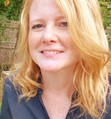Michelle Hauck's Blog, page 45
March 18, 2016
Motivation
Sorry, this isn't a pep talk. It's about writing. We all have different types of motivation and we all need it. It's what moves us and makes us act--or not act. And like conflict (see my post on types of conflict here), it's universal to all genres of writing. Humans need motivation and so should characters.
Every single character in your books, from the main character to the love interest to the janitor who is only in one scene, should have a reason behind the choices they make. Bad guys and bullies don't behave in an obstructive manner simply because they are "evil." They too have a motivation and a justification behind their actions, though it may be a twisted one.
And most characters don't act under a single driving factor. Katniss for example wanted to protect her sister, give them a better life while also wanting to escape it, desired to spend time with Gale, kept a wary eye on her mother, had a thing against the elites like Peeta, and probably deep down had a desire for revolution, all wrapped in a drive to survive and the wish to hold it all together for her dad.
The choices we make aren't determined by one desire. We're a roiling mass of conflicting emotions and worries and drives. The best characters reflect that. They have more than one factor pushing at them. More than one thought in their head.
Take this post for instance. I wanted to share a little of my experience with others who may be just beginning, but I also wanted to clarify my own ideas of motivation to myself. I needed to fill spots in my blog or it would sit empty, and it would be a nice bonus if it brought attention to me and sold some books--because people gotta make a living. I also needed a break from working on my WIP. Multiple motivations. And there are probably deeper ones buried having to do with ego.
So if your character has just one dream, say to get into an Ivy league college, they are probably going to feel a little flat to the reader. There should be a whole messy swirl of desires in their head and heart, probably conflicting at some point.
Ramiro from Grudging started out wanting very much to be like his brother and take his place in the military. Personal honor is a big part of his personality. Being reliable and dependable. Proving himself to his brother and not being an embarrassment. Thinking and not simply reacting during battle. Then there's his desire to keep his horse safe and survive the day. And deep down a desire to be his own man and not like everyone else. And of course those are his motivations for just the first chapter.
Like life, your desires change as your situation changes. Motivations aren't going to stay consistent over the life of a story. They'll evolve as a character evolves.
Recently I started reading a story rather like Cinderella, only this story failed to provide any motivation. In Cinderella, the stepsisters and stepmother had reasons behind their treatment of Cinderella--fear and jealousy. Fear she could take everything away from them. Fear the dad would like her better. Jealousy that she'd get what they deserved.
This story had a parent and siblings picking on the youngest member of the family. The older siblings got all the good treatment, were trained for society. The young main character had to sleep in the dirt, got teased and bullied. But immediately I'm thrown out of the story because they had absolutely no reason to act this way. All the rest of the family got along fine, why arbitrarily pick on the youngest? The MC wasn't deformed or simple minded or different in any way. There was simply no motivation for their crusade against him and it ruined the story for me. Maybe a motivation will appear down the road--maybe the MC isn't really related to them--but it's probably too late. I'm likely to quit reading before that happens.
So what should you do when you can't reveal the motivation of a character? Besides dropping a few hints, the author of that story could have had the MC be just as confused at their treatment as the reader. If the MC dwelt on the randomness of it, I would probably have let it go--accepted that and moved on--instead of letting it spoil the opening chapters.
As you are writing and editing keep in mind that characters need reasons for what they do and how they react. A character without a motivation is a hollow shell.
If anyone finds this, I'll give you a copy of Grudging. Just let me know.
Every single character in your books, from the main character to the love interest to the janitor who is only in one scene, should have a reason behind the choices they make. Bad guys and bullies don't behave in an obstructive manner simply because they are "evil." They too have a motivation and a justification behind their actions, though it may be a twisted one.
And most characters don't act under a single driving factor. Katniss for example wanted to protect her sister, give them a better life while also wanting to escape it, desired to spend time with Gale, kept a wary eye on her mother, had a thing against the elites like Peeta, and probably deep down had a desire for revolution, all wrapped in a drive to survive and the wish to hold it all together for her dad.
The choices we make aren't determined by one desire. We're a roiling mass of conflicting emotions and worries and drives. The best characters reflect that. They have more than one factor pushing at them. More than one thought in their head.
Take this post for instance. I wanted to share a little of my experience with others who may be just beginning, but I also wanted to clarify my own ideas of motivation to myself. I needed to fill spots in my blog or it would sit empty, and it would be a nice bonus if it brought attention to me and sold some books--because people gotta make a living. I also needed a break from working on my WIP. Multiple motivations. And there are probably deeper ones buried having to do with ego.
So if your character has just one dream, say to get into an Ivy league college, they are probably going to feel a little flat to the reader. There should be a whole messy swirl of desires in their head and heart, probably conflicting at some point.
Ramiro from Grudging started out wanting very much to be like his brother and take his place in the military. Personal honor is a big part of his personality. Being reliable and dependable. Proving himself to his brother and not being an embarrassment. Thinking and not simply reacting during battle. Then there's his desire to keep his horse safe and survive the day. And deep down a desire to be his own man and not like everyone else. And of course those are his motivations for just the first chapter.
Like life, your desires change as your situation changes. Motivations aren't going to stay consistent over the life of a story. They'll evolve as a character evolves.
Recently I started reading a story rather like Cinderella, only this story failed to provide any motivation. In Cinderella, the stepsisters and stepmother had reasons behind their treatment of Cinderella--fear and jealousy. Fear she could take everything away from them. Fear the dad would like her better. Jealousy that she'd get what they deserved.
This story had a parent and siblings picking on the youngest member of the family. The older siblings got all the good treatment, were trained for society. The young main character had to sleep in the dirt, got teased and bullied. But immediately I'm thrown out of the story because they had absolutely no reason to act this way. All the rest of the family got along fine, why arbitrarily pick on the youngest? The MC wasn't deformed or simple minded or different in any way. There was simply no motivation for their crusade against him and it ruined the story for me. Maybe a motivation will appear down the road--maybe the MC isn't really related to them--but it's probably too late. I'm likely to quit reading before that happens.
So what should you do when you can't reveal the motivation of a character? Besides dropping a few hints, the author of that story could have had the MC be just as confused at their treatment as the reader. If the MC dwelt on the randomness of it, I would probably have let it go--accepted that and moved on--instead of letting it spoil the opening chapters.
As you are writing and editing keep in mind that characters need reasons for what they do and how they react. A character without a motivation is a hollow shell.
If anyone finds this, I'll give you a copy of Grudging. Just let me know.
Published on March 18, 2016 04:30
March 17, 2016
Great Short Story Opportunity
Hey all, I've got a great opportunity for you here if you have a few short stories lying around. Matt Sinclair runs a small press called Elephants Bookshelf that is looking for short stories for their latest anthology. This is a helpful way to get some publishing credits under your belt for those query letters and let you work with an editor. I had two stories in their anthologies and there are a couple of big named authors there too. Take it away Matt:
First I want to thank Michelle for inviting me to write a post for her blog. In all honesty, it’s one of the few blogs I still check regularly, even as others fade in my thoughts. From her contests and interviews to general posts about things of interest to writers, her blog always has something I’m interested in reading.
That’s refreshing, as my interests have changed as I’ve become more involved in the publishing side of the industry and, unfortunately, found less time for my own fiction writing. Although sometimes my knees buckle at the curveballs that life throws my way, I’ve come to realize that change is good. It keeps my brain invigorated and my perspective open to new possibilities. And that keeps my mind creative, which helps my writing. I think it’s something more writers like us can – and should – do.
Since I’m not exactly a household name in too many households, let me share a tiny bit about me and Elephant’s Bookshelf Press, the publishing company I started more than four years ago. It may be hard to believe, but back in 2011 and 2012, the epublishing revolution was very much in its infancy. It was exciting to think about reaching a vast sea of readers and sharing the work of lots of writers they probably didn’t know. Our goals with EBP included helping talented authors gain some experience with the publishing process – and credits – while they continued to seek representation or developing and expanding their audience.
We started with an anthology, Spring Fevers (take a look as a sample of our work via Smashwords or Amazon), and that anthology led to the next, The Fall (Smashwords or Amazon). Soon, we were mapping out the “seasons series,” (which included a couple stories from Michelle) of anthologies with a variety of themes.
Ten books later, we’ve launched our latest request for submissions. This time, it’s a collection of Urban Fantasy stories. While I have long enjoyed urban fantasy as a reader, I’ve not written it too much. But again, that’s one of the joys of this brave new world of publishing: we don’t have to pigeon-hole our writing completely into one genre. Even if an author writes YA, there’s no reason she can’t experiment with horror or science fiction. Heck, although literary fiction is a very difficult genre to break into for unknown authors, there’s still a large readership for a well told story.
In our most recent anthology, Horrors: Real, Imagined, and Deadly (Smashwords or Amazon), one of the writers, who had submitted stories to us in the past that were not published, told me she’d never written in the horror genre before. Her story was delightfully chilling. Voila! Her first EBP story.
When is the last time you experimented? It’s possible you do it often. Perhaps your work typically includes a character unlike you’ve ever written before. Or maybe your settings or story structure vary from piece to piece. Great! Perhaps you experiment with length from piece to piece. I love both short stories and novels and work in both forms. I’m working on an urban fantasy piece right now that’s very different from stories I’ve written in the past. If you’re looking to experiment, we’d love to consider your story or stories for the Urban Fantasy anthology; the deadline to submit is July 11. Feel free to ask me any questions you have.
But whether you submit a story for EBP or not, I hope you continue to experiment with your writing. Even if you’re a devotee of a specific genre, it can only help liven up your writing!
First I want to thank Michelle for inviting me to write a post for her blog. In all honesty, it’s one of the few blogs I still check regularly, even as others fade in my thoughts. From her contests and interviews to general posts about things of interest to writers, her blog always has something I’m interested in reading.
That’s refreshing, as my interests have changed as I’ve become more involved in the publishing side of the industry and, unfortunately, found less time for my own fiction writing. Although sometimes my knees buckle at the curveballs that life throws my way, I’ve come to realize that change is good. It keeps my brain invigorated and my perspective open to new possibilities. And that keeps my mind creative, which helps my writing. I think it’s something more writers like us can – and should – do.
Since I’m not exactly a household name in too many households, let me share a tiny bit about me and Elephant’s Bookshelf Press, the publishing company I started more than four years ago. It may be hard to believe, but back in 2011 and 2012, the epublishing revolution was very much in its infancy. It was exciting to think about reaching a vast sea of readers and sharing the work of lots of writers they probably didn’t know. Our goals with EBP included helping talented authors gain some experience with the publishing process – and credits – while they continued to seek representation or developing and expanding their audience.
We started with an anthology, Spring Fevers (take a look as a sample of our work via Smashwords or Amazon), and that anthology led to the next, The Fall (Smashwords or Amazon). Soon, we were mapping out the “seasons series,” (which included a couple stories from Michelle) of anthologies with a variety of themes.
Ten books later, we’ve launched our latest request for submissions. This time, it’s a collection of Urban Fantasy stories. While I have long enjoyed urban fantasy as a reader, I’ve not written it too much. But again, that’s one of the joys of this brave new world of publishing: we don’t have to pigeon-hole our writing completely into one genre. Even if an author writes YA, there’s no reason she can’t experiment with horror or science fiction. Heck, although literary fiction is a very difficult genre to break into for unknown authors, there’s still a large readership for a well told story.
In our most recent anthology, Horrors: Real, Imagined, and Deadly (Smashwords or Amazon), one of the writers, who had submitted stories to us in the past that were not published, told me she’d never written in the horror genre before. Her story was delightfully chilling. Voila! Her first EBP story.
When is the last time you experimented? It’s possible you do it often. Perhaps your work typically includes a character unlike you’ve ever written before. Or maybe your settings or story structure vary from piece to piece. Great! Perhaps you experiment with length from piece to piece. I love both short stories and novels and work in both forms. I’m working on an urban fantasy piece right now that’s very different from stories I’ve written in the past. If you’re looking to experiment, we’d love to consider your story or stories for the Urban Fantasy anthology; the deadline to submit is July 11. Feel free to ask me any questions you have.
But whether you submit a story for EBP or not, I hope you continue to experiment with your writing. Even if you’re a devotee of a specific genre, it can only help liven up your writing!
Published on March 17, 2016 04:30
March 15, 2016
Signed Copies
If you can't make it to C2E2 on Saturday, you can get signed copies on Goodreads.
.goodreadsGiveawayWidget { color: #555; font-family: georgia, serif; font-weight: normal; text-align: left; font-size: 14px; font-style: normal; background: white; } .goodreadsGiveawayWidget p { margin: 0 0 .5em !important; padding: 0; } .goodreadsGiveawayWidgetEnterLink { display: inline-block; color: #181818; background-color: #F6F6EE; border: 1px solid #9D8A78; border-radius: 3px; font-family: "Helvetica Neue", Helvetica, Arial, sans-serif; font-weight: bold; text-decoration: none; outline: none; font-size: 13px; padding: 8px 12px; } .goodreadsGiveawayWidgetEnterLink:hover { color: #181818; background-color: #F7F2ED; border: 1px solid #AFAFAF; text-decoration: none; }
Goodreads Book Giveaway
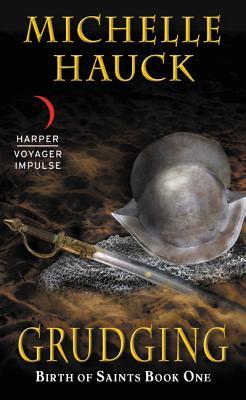
Grudging
by Michelle Hauck
Giveaway ends March 20, 2016.
See the giveaway details
at Goodreads.
Enter Giveaway
Published on March 15, 2016 12:02
Getting the Call An Agent Perspective with Caitlen Rubino Bradway
We have a first! A Getting the Call post from the point of view of an agent who is also a writer. So enjoy the post and give a look to her just released novel, SUPERNORMAL. I'll put the blurb at the end of this post.
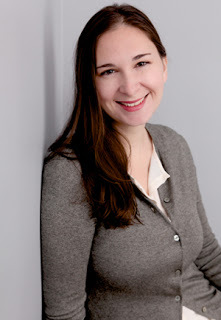
I still get nervous before a call with an author. It’s because if we get to the call stage, I really, really like your book, and I’m seriously considering offering representation. It’s also because when it comes to communicating with other humans, I’m much better on paper than I am with my mouth words. I find it helps to have notes in front of me, to make sure I haven’t had too much coffee, and know what I’m looking for when I get on the call. Because that call is less about the book than it is about the author.
So what am I looking for? Well, a couple things, so for ease and efficiency I will put them in a list format. (But please note these are all equal levels of importance; I just like lists, they let me pretend I’m actually super-organized.)
#1: Is this author someone I can talk to? I don’t expect us to be best friends right off the bat, but do we have an easy back-and-forth? At the LKG Agency, when we’re considering representation, we’re looking at it as acquiring an author, not a single project. Which means if this works out, there’s going to be a lot of communicating, and it will only help if we’re able to do that in a friendly and reasonable fashion. And it’s even more important because of —
#2: Are we on the same page with the manuscript? I am a very editorial agent. I love working on stories with authors, talking about their characters, the plot, troubleshooting what works, what doesn’t, and how to make it better. I want to know if we agree on revisions and the direction the story would go. That I’m not seeing your middle grade as a stand alone when you had envisioned it as the first in a series. It’s important that we have the same vision, because if we don’t, that’s a good sign that I’m not the right agent for this project.
That’s not saying I expect the author to blindly agree with me on every single comment or edit I have. I want to hear the author’s thoughts on the things I suggest — I think this scene doesn’t work for that reason, but they wrote that scene because they were trying to demonstrate something about the villain, perhaps if we went about it in this way instead of that. Going back to #1, I’m looking for that back-and-forth. I tend to get nervous on the phone when authors respond monosyllabically to my comments — does that mean they agree? They don’t agree? Do they hate everything I’m suggesting or are they interested in moving forward with a revision? So, please, let me know your thoughts. Do you think my suggestions will work? If you don’t agree with the changes I suggest, then why not? What are you trying to accomplish with this story, series, character?
#3: The author is approaching this professionally. I’m sure you’ve heard by now that writing the book is the easy (and fun) part. Publishing it is a whole different story. I want to know that the author is ready and willing to tackle all of the work that is to come, and that they have realistic expectations of the process. It’s one thing to say in your query letter that your book is going to be the next Harry Potter, but if I’m talking to an author and it’s clear they sincerely expect that level of success for their debut middle grade fantasy — and expect it immediately — I get concerned. (Also, please, don’t compare your book to HP in the query.)
One big way I know the author is tackling this professionally — they have questions for me. I love it when authors have questions for me, because it shows me that they’re willing to sit down and do the work even before I offer representation. So ask me questions: If we move forward, do I see it as taking on just a single book or taking on the author? How is this process going to work? (The author.) Is there a written agreement? (Yes.) What kind of percentage does the LKG Agency take? (Standard ‘first-born unless you can guess my full name’ setup.) What happens if the book doesn’t sell? (Open a bottle of your adult beverage of choice, and then start working on the next project.)
#4: What do they have on the back burner? I always want to know what other ideas the author has cooking. What they’re working on now, and what they plan on working on next. I want to know how they see themselves as an author, especially because the LKG Agency only handles non-fiction, middle grade, and young adult fiction. So if this middle grade novel is something fun and different they wanted to try, but they really see themselves as an adult sci-fi and fantasy author, then it’s not the right fit.
There are, of course, other things I need to know about you — do you think Galavant should be renewed for a third season? Where do you fall in the Batman vs Superman argument (Team Wonder Woman all the way, obviously) — but those are the main points. At the end of the day, I’m trying to find out if we can work together. And the phone call is the first step.
---------------------------
I joined the LKG Agency in 2008, thereby disproving the theory that no English major ever does anything with their degree. Before that I worked at another literary agency, Don Congdon Associates, where I had the behind-the-scenes thrill of seeing Kathryn Stockett’s The Help first come in (and getting one of the first reads). And before that I was getting my Masters in English and Publishing from Rosemont College. I have enjoyed my apprenticeship under Lauren very much, and I am now actively looking to build my own list, which includes (after a surprisingly minimal amount of begging and pleading on my part), securing Lauren’s agreement to open the agency to considering middle grade and young adult fiction.In my spare time, I am an author in my own right (or is that write?). My first book, Lady Vernon and Her Daughter, which I co-wrote with my mother, was released by Crown in 2009. We also contributed to Jane Austen Made Me Do It, published by Ballantine in 2011. My first middle grade novel, Ordinary Magic, was published by Bloomsbury Children’s in 2012.Website|Twitter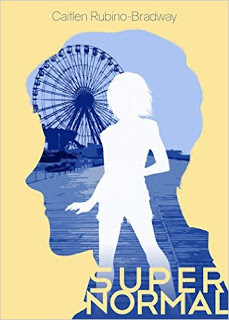
Camron Scott can see the future.
It's not as cool as you'd think. He can't see anything he's directly involved in, meaning no placing bets on sports events or stocks, or finding his true love. And it's fun trying to explain his power to to the cops whenever he tries to stop a disaster in it's tracks. The most recent complication landed him on a plane to sunny California, but at least this move best him way from his restrictive family and grants him the hope of finding a new home and a new life.
What he doesn’t expect to find is a town seeded with people like himself, people with a special extra something. People like Ashley Garrett.
Ashley is a super freak — charged with speed, strength, and crazy sensory perception. But she wasn't born with these talents. She’s just trying to learn how to live with them, and she’s spent the last year walking a tightrope between maintaining control and losing everything. When Cam has a vision of Ashley attacking some poor dumb kid, he does what he always does — steps in, saves the day, changes the future. And an unlikely partnership is born. He promises to use his ability to watch out for her and make sure she doesn’t lose control, a promise that Ashley is desperate enough to accept. The connection that develops surprises them both.
But the super-powered road never did run smooth. When a series of kidnappings rocks the town, Ashley and Cam must figure out who is behind it all, and how to stop it. As you do when you're super powered — but really all Cam and Ashley want is to find a way to be is Supernormal.

I still get nervous before a call with an author. It’s because if we get to the call stage, I really, really like your book, and I’m seriously considering offering representation. It’s also because when it comes to communicating with other humans, I’m much better on paper than I am with my mouth words. I find it helps to have notes in front of me, to make sure I haven’t had too much coffee, and know what I’m looking for when I get on the call. Because that call is less about the book than it is about the author.
So what am I looking for? Well, a couple things, so for ease and efficiency I will put them in a list format. (But please note these are all equal levels of importance; I just like lists, they let me pretend I’m actually super-organized.)
#1: Is this author someone I can talk to? I don’t expect us to be best friends right off the bat, but do we have an easy back-and-forth? At the LKG Agency, when we’re considering representation, we’re looking at it as acquiring an author, not a single project. Which means if this works out, there’s going to be a lot of communicating, and it will only help if we’re able to do that in a friendly and reasonable fashion. And it’s even more important because of —
#2: Are we on the same page with the manuscript? I am a very editorial agent. I love working on stories with authors, talking about their characters, the plot, troubleshooting what works, what doesn’t, and how to make it better. I want to know if we agree on revisions and the direction the story would go. That I’m not seeing your middle grade as a stand alone when you had envisioned it as the first in a series. It’s important that we have the same vision, because if we don’t, that’s a good sign that I’m not the right agent for this project.
That’s not saying I expect the author to blindly agree with me on every single comment or edit I have. I want to hear the author’s thoughts on the things I suggest — I think this scene doesn’t work for that reason, but they wrote that scene because they were trying to demonstrate something about the villain, perhaps if we went about it in this way instead of that. Going back to #1, I’m looking for that back-and-forth. I tend to get nervous on the phone when authors respond monosyllabically to my comments — does that mean they agree? They don’t agree? Do they hate everything I’m suggesting or are they interested in moving forward with a revision? So, please, let me know your thoughts. Do you think my suggestions will work? If you don’t agree with the changes I suggest, then why not? What are you trying to accomplish with this story, series, character?
#3: The author is approaching this professionally. I’m sure you’ve heard by now that writing the book is the easy (and fun) part. Publishing it is a whole different story. I want to know that the author is ready and willing to tackle all of the work that is to come, and that they have realistic expectations of the process. It’s one thing to say in your query letter that your book is going to be the next Harry Potter, but if I’m talking to an author and it’s clear they sincerely expect that level of success for their debut middle grade fantasy — and expect it immediately — I get concerned. (Also, please, don’t compare your book to HP in the query.)
One big way I know the author is tackling this professionally — they have questions for me. I love it when authors have questions for me, because it shows me that they’re willing to sit down and do the work even before I offer representation. So ask me questions: If we move forward, do I see it as taking on just a single book or taking on the author? How is this process going to work? (The author.) Is there a written agreement? (Yes.) What kind of percentage does the LKG Agency take? (Standard ‘first-born unless you can guess my full name’ setup.) What happens if the book doesn’t sell? (Open a bottle of your adult beverage of choice, and then start working on the next project.)
#4: What do they have on the back burner? I always want to know what other ideas the author has cooking. What they’re working on now, and what they plan on working on next. I want to know how they see themselves as an author, especially because the LKG Agency only handles non-fiction, middle grade, and young adult fiction. So if this middle grade novel is something fun and different they wanted to try, but they really see themselves as an adult sci-fi and fantasy author, then it’s not the right fit.
There are, of course, other things I need to know about you — do you think Galavant should be renewed for a third season? Where do you fall in the Batman vs Superman argument (Team Wonder Woman all the way, obviously) — but those are the main points. At the end of the day, I’m trying to find out if we can work together. And the phone call is the first step.
---------------------------
I joined the LKG Agency in 2008, thereby disproving the theory that no English major ever does anything with their degree. Before that I worked at another literary agency, Don Congdon Associates, where I had the behind-the-scenes thrill of seeing Kathryn Stockett’s The Help first come in (and getting one of the first reads). And before that I was getting my Masters in English and Publishing from Rosemont College. I have enjoyed my apprenticeship under Lauren very much, and I am now actively looking to build my own list, which includes (after a surprisingly minimal amount of begging and pleading on my part), securing Lauren’s agreement to open the agency to considering middle grade and young adult fiction.In my spare time, I am an author in my own right (or is that write?). My first book, Lady Vernon and Her Daughter, which I co-wrote with my mother, was released by Crown in 2009. We also contributed to Jane Austen Made Me Do It, published by Ballantine in 2011. My first middle grade novel, Ordinary Magic, was published by Bloomsbury Children’s in 2012.Website|Twitter

Camron Scott can see the future.
It's not as cool as you'd think. He can't see anything he's directly involved in, meaning no placing bets on sports events or stocks, or finding his true love. And it's fun trying to explain his power to to the cops whenever he tries to stop a disaster in it's tracks. The most recent complication landed him on a plane to sunny California, but at least this move best him way from his restrictive family and grants him the hope of finding a new home and a new life.
What he doesn’t expect to find is a town seeded with people like himself, people with a special extra something. People like Ashley Garrett.
Ashley is a super freak — charged with speed, strength, and crazy sensory perception. But she wasn't born with these talents. She’s just trying to learn how to live with them, and she’s spent the last year walking a tightrope between maintaining control and losing everything. When Cam has a vision of Ashley attacking some poor dumb kid, he does what he always does — steps in, saves the day, changes the future. And an unlikely partnership is born. He promises to use his ability to watch out for her and make sure she doesn’t lose control, a promise that Ashley is desperate enough to accept. The connection that develops surprises them both.
But the super-powered road never did run smooth. When a series of kidnappings rocks the town, Ashley and Cam must figure out who is behind it all, and how to stop it. As you do when you're super powered — but really all Cam and Ashley want is to find a way to be is Supernormal.
Published on March 15, 2016 04:30
March 14, 2016
Query Kombat '16 News

As has been the trend with Query Kombat, a new year brings new changes. And this year is no different. As many of you know, last year ended a little rough for our QK family. Michelle and I voted SC out of the group, causing some in the writing community to question our judgement.
Truth is, SC found a greater passion in his Write Inclusively campaign. It's a cause he vehemently believes in, and a change many (including myself and Michelle) would like to see come to fruition. Unfortunately, we couldn't see eye to eye on every detail, and that triggered our desire to keep Query Kombat and Write Inclusively (as entities, not ideologies) separate. When we couldn't come to an agreement on the degree of separation, Michelle and I were faced with a decision. And we made one.
SC was an asset to Query Kombat. Hell, without him, I may not have had the courage to see my idea through. Regardless of his day to day involvement from here forward, SC helped mold the Query Kombat tournament, as well as the dynamic of our group behind the scenes. He will forever be a part of the legacy of Query Kombat, and I hope one day we can work with him again.
As I said, though, a new year brings new changes! And exciting ones at that. Today, we're officially welcoming a new member into the QK Crew. Many of you may remember her from QK2014 as an agent round veteran. Now, she'll be behind the scenes helping to make others dreams come true.
So, without further ado, I'd like to welcome Laura Heffernan!
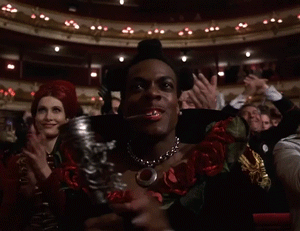
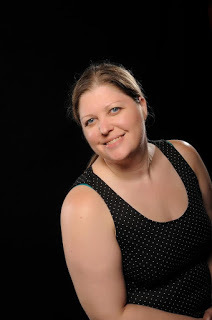 Laura Heffernan is a California-born women's fiction writer, represented by Michelle Richter at Fuse Literary. One Saturday morning when she was four or five, Laura sat down at the family's Commodore 64 and typed out her first short story. She's written ever since. Laura also works as a freelance editor. She's pro-Oxford comma, anti-unnecessary-to be-verbs, and believes cookie dough is a key food group.
Laura Heffernan is a California-born women's fiction writer, represented by Michelle Richter at Fuse Literary. One Saturday morning when she was four or five, Laura sat down at the family's Commodore 64 and typed out her first short story. She's written ever since. Laura also works as a freelance editor. She's pro-Oxford comma, anti-unnecessary-to be-verbs, and believes cookie dough is a key food group.When she used to have spare time, Laura enjoyed travel, baking, board games, and new experiences. She lives in the northeast, freezing like the true California girl she is, with her amazing husband and two furry little beasts. Although her growing fuzzy sock collection is becoming impressive, Laura eagerly awaits the return of flip-flop season.
www.lauraheffernan.comwww.twitter.com/@LH_Writes
Feel free to tweet your congrats using the #QueryKombat hashtag! And stop by Laura's blog to see the winners of the crossword puzzle host game.
Published on March 14, 2016 05:00
March 11, 2016
Speakers Badge
I'll be picking up my first speakers badge on Saturday, March 19th at C2E2. That's in Chicago in case you are as ignorant about cons as I am. I'm on a panel that seems right up my alley called Fight the Power at 12:30 Central time. Here's the description:
Frodo and the Fellowship fought Sauron and his evil horde; a rag-tag group of rebels take down the Empire in a galaxy far, far away. Sci-fi/ Fantasy is full of stories about revolution, a few taking on many, an unlikely hero surmounting incredible odds to achieve victory. A panel of SFF authors will discuss their favorite stories of SFF revolution, and what they like so much about writing books where their characters take on the man and fight the power, no matter what the odds of success are!
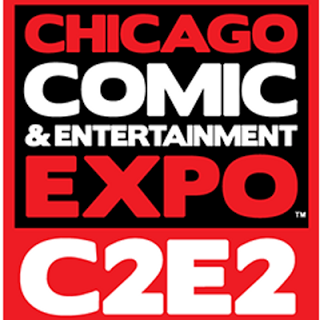
Pretty good panel for a girl who wrote a book about a city under siege from a crazy huge army and who loves to read epic fantasy. I think Grudging fits right into that topic. There will be a book signing afterwards and I hope to see some friendly faces!
So help me out. This is my first con. WHAT DO I NEED TO KNOW? What should I make sure to do or see? What should I take for the book signing? Leave me informative comments about your experience at cons. I'm a trifle nervous about it all.
And also if you're a fan of SFF, how would you answer this topic? What are your favorite books where the characters fight the power? Why do bigger odds and larger consequences make the story more exciting for you?
Frodo and the Fellowship fought Sauron and his evil horde; a rag-tag group of rebels take down the Empire in a galaxy far, far away. Sci-fi/ Fantasy is full of stories about revolution, a few taking on many, an unlikely hero surmounting incredible odds to achieve victory. A panel of SFF authors will discuss their favorite stories of SFF revolution, and what they like so much about writing books where their characters take on the man and fight the power, no matter what the odds of success are!

Pretty good panel for a girl who wrote a book about a city under siege from a crazy huge army and who loves to read epic fantasy. I think Grudging fits right into that topic. There will be a book signing afterwards and I hope to see some friendly faces!
So help me out. This is my first con. WHAT DO I NEED TO KNOW? What should I make sure to do or see? What should I take for the book signing? Leave me informative comments about your experience at cons. I'm a trifle nervous about it all.
And also if you're a fan of SFF, how would you answer this topic? What are your favorite books where the characters fight the power? Why do bigger odds and larger consequences make the story more exciting for you?
Published on March 11, 2016 14:24
March 9, 2016
Guess the New Host Game!

Michael and I are excited to reveal our new host for Query Kombat 2016! We can’t just tell you, though, because that’s not any fun. So, we’ve turned it into a game.

Complete the crossword puzzle below, then unscramble the letters to find the new host’s name, and email the answer to querykombat (at) gmail (dot) com by Sunday, March 13. All correct responses will be entered in a drawing to win a query critique from one of the three hosts. Winners announced on all three blogs next Monday!
Make sure to follow all three of us on Twitter (@Michelle4Laughs, @RavenousRushing, You figure out the third) so you don’t miss any contest news or announcements.
Good luck!

Across
4. The title of the second book in Michelle's Birth of Saints series, coming soon: _ _ _ _ _ _ _ _
9. One of the best pieces of advice the newhost has for new writers is to read
as widely as possible within your _ _ _ _ _ .
11. The original creator of Query Kombat is _ _ _ _ _ _ _ _ _ _ _ _ _ _. [2 words]
14. The title of that his novel. _ _ _ _ _ _ _ _ _ _ _ _ _ _ _ _ _. [4 words]
Down
1. Our new host is a contest veteran, getting agented shortly after participating
in _ _ _ _ _ _ _ _ _ _ 2014. [2 words]
2. Know your appropriate _ _ _ _ _ _ _ _ _ _. Too far off in either direction could
result in an automatic no. [2 words]
3. One of the most important aspects of querying is to do your _ _ _ _ _ _ _.
5. The new host is represented by Fuse _ _ _ _ _ _ _.
6. Mike’s first novel is a work of _ _ _ _ _ _ _ _ _. [Category and genre]
7. To find an agent, be sure to polish your _ _ _ _ _.
8. Michelle’s Birth of Saints series is published by _ _ _ _ _ _ _ _ _ _ _ _ _. [2 words]
10. Our new host is a hardcore fan of _ _ _ _ _, the Vampire Slayer.
12. Long-time co-host and co-creator of Query Kombat: _ _ _ _ _ _ _ _ _ _ _ _ _. [2 words]
13. Although a reader of nearly every category and genre, our new host primarily
writes _ _ _ _ _ fiction.
Published on March 09, 2016 05:00
March 8, 2016
Cover Reveal for DUAL DESTINY
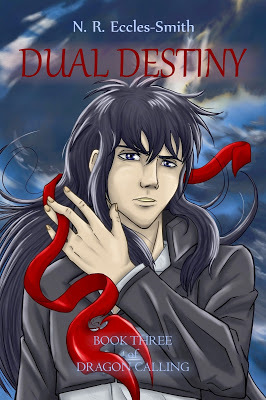
Title: Dual Destiny (Book Three of Dragon Calling)
Publisher: Starsea Press
Genre: Fantasy adventure
Audience: Upper MG (ages 10+)
Laeka’Draeon and his companions have awakened the first of the Beacon Throne guardians. But only with the power of all four guardians can he hope to stop Valadae’s imminent destruction and fulfil his calling as the last of the dragons.
His journey takes him west, into a kingdom rife with conflict and unexpected perils. And when one of Laeka’Draeon’s friends is captured by Trappers, his actions lead to terrifying consequences.
Twisted magic, wicked schemes, and a choice that threatens to doom his quest to failure—Laeka’Draeon faces his greatest challenge yet, and this time the powers of a dragon are useless.
Naomi confesses the best word to describe her is: whimsical. Forget “the girl next door” and think more along the lines of “the girl from the next galaxy over” and you’d be closer to the correct personality categorization. She is an unequivocal day-dreamer, anime enthusiast, partisan of fantastical things, and unshakable devotee to story-telling.
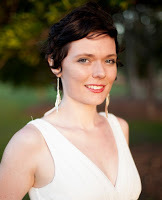
In addition to writing, Naomi sings, draws, reads, plays console games, does the occasional concept art commissions, and works with rescued animals. Her love for absorbing fabulous, unforgettable stories is only out-shined by her love for creating her own.
Currently, she lives with crazy cats, crazier family members, and blessedly tolerant housemate on the Gold Coast, Australia.
Amazon: http://www.amazon.com/Dual-Destiny-Dragon-Calling-Book-ebook/dp/B01C426FEQ/ref=sr_1_2?ie=UTF8&qid=1457164637&sr=8-2&keywords=dual+destiny
Smashwords: https://www.smashwords.com/books/view/617658
Goodreads: https://www.goodreads.com/book/show/29348251-dual-destiny
Facebook Page: https://www.facebook.com/dragoncalling/
Author Facebook Page: https://www.facebook.com/nrecclessmith.author/
Website: https://dragoncalling.wordpress.com/
Twitter: https://twitter.com/ProwlerofProse
Pinterest: https://www.pinterest.com/thewhimwerecat/
Published on March 08, 2016 05:11
March 7, 2016
Query Questions with Caitlen Rubino-Bradway
Writers have copious amounts of imagination. It's what makes their stories so fantastic. But there's a darker side to so much out of the box thinking. When a writer is in the query trenches, their worries go into overdrive. They start pulling out their hair and imagine every possible disaster.

Here to relieve some of that endless worrying is a new series of posts called Query Questions. I'll ask the questions which prey on every writer's mind, and hopefully take some of the pain out of querying. These are questions that I've seen tossed around on twitter and writing sites like Agent Query Connect. They are the type of questions that you need answers for the real expert--agents!
If you have your own specific query question, please leave it in the comments and it might show up in future editions of Query Questions as I plan to rotate the questions.
Caitlen Rubino-Bradway is an agent and author with the LKG Agency. She is considering young adult and middle grade and looking to build her list of clients.
Is there a better or worse time of year to query?
For us, the worst times are probably early-December to the second week in Jan, and early Sept/mid June. Things tend to get crazy just before and just after the Winter break and when everyone’s starting their summer vacation or getting back in the fall. Think of it like the school year — if class isn’t in session, it’s not a great time. Except for mid-summer through August, which tends to be a good time to submit because things slow down and there’s a lot of reading time…so basically not like school at all, I guess.
Does one typo or misplaced comma shoot down the entire query?
No, of course not. We’ve all had that moment where we realized our email had a glaring spelling mistake just after we hit send. The problem is when there are multiple typos or bad commas, so it looks like you just hammered the letter out and sent it along without even proofreading it once. If the letter looks sloppy, it’s makes me think that the author isn’t willing to put in the nitty gritty work of publishing. And publishing has a lot of nitty gritty.
Do you look at sample pages without fail or only if the query is strong?
I look at the sample pages 90% of the time. Writing queries is hard, and a lot of times how good, or bad, a query is doesn’t reflect how good/bad the story or writing is. And the best thing that can give me a real sense of your book is the writing sample. If I don’t read the sample pages, it’s because it’s obvious from the query that the project is not something I’m interested in — it’s adult fiction, when we only handle YA and MG, or it’s a subject neither Lauren or I are really interested in.
Do you have an assistant or intern go through your queries first or do you check all of them?
We briefly had an intern, but for the most part it’s just me and Lauren checking all of the queries. Sitting across from each other. Usually sharing a bag of Reese’s mini peanut butter cups.
Do you keep a maybe pile of queries and go back to them for a second look?
Absolutely. Sometimes you’re reading queries at the end of the day and you’re tired, and your brain starts going fuzzy on how this whole ‘word’ thing works. Sometimes a query hits a couple of your rejection flags, but there’s something about it that still hooks us and we need some time to think it over. If something isn’t an obvious yes or no, then we’ll put it aside to read later, and then pass over to whoever hasn’t read it so we can get a second opinion.
If the manuscript has a prologue, do you want it included with the sample pages?
Yup! We ask to see the first three chapters, and I’m happy to take a look at the prologue in addition to that sample material. However, the story has to really convince me it needs a prologue — in my experience, a lot of prologues can fit easily and much more smoothly into the main body of the story later on, or they get very info-dumpy. (I prefer my info-dumps to be select and strategic, as if I’m a five-year-old and you’re trying to sneak veggies into my mac and cheese.)
How important are comp titles? Is it something you want to see in a query?
For fiction, it’s not really important, though an ‘X meets Y’ pitch, or a ‘for fans of X and Z,’ is always a good cheat sheet for me. For nonfiction, comp titles are pretty important, though it’s not something you have to mention in a query — as long as they’re in the proposal, which should have a Competition/Competitive Titles section, and detail 4-5 comparable books and why your book will fill a need they don’t.
Some agencies mention querying only one agent at a time and some say query only one agent period. How often do you pass a query along to a fellow agent who might be more interested?
The LKG Agency is a smaller agency — me and Lauren — and we’re both looking for the same kind of books. Which means we pass queries back and forth all the time, debating whether or not it sounds promising, if we like the sample material, and who should take lead if we want to move forward. Often while sitting across from each other, and then debating whether or not to make s’mores. (The answer is usually yes.)
Do you prefer a little personalized chit-chat in a query letter, or would you rather hear about the manuscript?
I don’t mind if an author wants to chit-chat, or if they just want to get down to business. But I always appreciate it when they casuallydrop a few hints to show they’ve done their research on me, Lauren, and the agency. I love to see they’ve put some time and thought into whether or not we’d be a good match.
Most agents have said they don’t care whether the word count/genre sentence comes first or last. But is it a red flag if one component is not included?
Yes, but not so much that I’m going to reject a query because it’s not included. Honestly, if the word count’s not included, I start worrying that the manuscript is going to be 300,000 words. (And when something is 300,000 words, I start to worry about how receptive the author is going to be towards cuts, because at 300k there’s going to have to be cuts.) And if I can’t tell the genre from the plot blurb in the query, well, then we’ve got bigger problems than categorization.
That being said, you really should include all of the relevant information about your manuscript. If it doesn’t have everything I need and I have to email back to ask for something, there’s a good chance it’s getting moved to the bottom of the pile.
Writers hear a lot about limiting the number of named characters in a query. Do you feel keeping named characters to a certain number makes for a clearer query?
Yes. But I don’t have a set number I recommend for a query. The important thing is to keep the info in your query clean and concise; if I want to learn more, that’s what the synopsis and sample material are for. But when a query starts go into every Tom, Dick, and Zuul that the main character comes across, my eyes start to glaze over.
Should writers sweat the title of their book (and character names) or is that something that is often changed by publishers?
In my experience, the title is changed about 60% of the time, for a variety of reasons. Sometimes they might think it doesn’t reflect the story well. But most of the time it’s because they want a title that’s going to better appeal to your audience, they want to hit certain keywords that tend to make people pick up the book, or they want to avoid comparison with another book that is already out. For instance, my middle grade fantasy was changed from The Extraordinarily Ordinary Tale of Abigail Hale (I’m not great with titles) to Ordinary Magic for all of those reasons — but particularly because at the time Bloomsbury had just published The Extra-Ordinary Princess and they wanted to work the word ‘Magic’ into the title. And while the publisher has final say in the title, they also consult extensively with the author to find a title that everyone is happy with.
As for character names, I’ve never had an editor ask a writer to change them. Though I imagine if you named your character Harry Potter, they’d ask you to change it for obvious reasons.
How many queries do you receive in a week? How many requests might you make out of those?
I’d say we get about 30-50 queries a week, and of those we might pursue five.
Many agents say they don't care if writers are active online. Could a twitter account or blog presence by a writer tip the scales in getting a request or offer? And do you require writers you sign to start one?
Again, it’s different for fiction and nonfiction. In either case, it is kind of expected that an author has an online presence of some kind, but for fiction it isn’t going to make the difference between an offer or a rejection. At the end of the day, it’s always about the story. For nonfiction, however, the author’s platform — the publicity they have at their disposal — is very important. I’ve seen nonfiction proposals bought or sold depending on the platform.
Some writers have asked about including links to their blogs or manuscript-related artwork. I’m sure it’s not appropriate to add those links in a query, but are links in an email signature offensive?
Those links are perfectly appropriate to include in the signature of an email.
If a writer makes changes to their manuscript due to feedback should they resend the query or only if material was requested?
If you’ve made significant changes, then it’s perfectly fine to reach out to the agent and ask if they’d like to see it, whether it’s just been a query or the material’s been requested. But that’s significant changes — if you’ve tweaked something in three chapters then it’s probably not worth reaching out.
What bio should an author with no publishing credits include?
For fiction, they should include any relevant experience, such as writing competitions they’ve won or been finalists in. But, again, it’s all about the story. Don’t panic if you don’t have any publishing credits. For nonfiction, they should include all of their relevant credentials, any degrees they have, letters after their name, or particular experience they have that shows why they’re the best authority on this topic.
What does ‘just not right mean for me’ mean to you?
It means I simply didn’t fall in love with your story. There can be nothing wrong with your story — it can be well-written, with dynamic characters and fast-paced action — but I just didn’t love it. And as an agent, I’m going to put in a lot of time working with you on the story, getting it ready to send out, negotiating the contract, so I need to be passionate about a story when I take it on.
What themes are you sick of seeing?
Dreams. Anything with dreams — meaningful dreams, symbolic dreams, prophetic dreams, magical telepathic dreams in which the main character communicates, and then falls in love with, their love interest. I see that all the time.
Also love triangles. No more love triangles. Please.
Do you consider yourself a hands-on, editorial type of agent?
Very much so. Both because I love working on stories with authors, and because I’m increasingly seeing editors who want manuscripts that are as close to publishing-quality as possible. Plus working on the stories is the fun part!
What three things are at the top of your submission wish list?
Stories with really vibrant and unusual settings, diverse main characters, and YA high fantasy.
What are some of your favorite movies or books to give us an idea of your tastes? I’m a huge Star Wars fan (requisite prequel grumbling), and I tend to find ways to recommend John Wick and Mad Max: Fury Road to anyone I meet, during any conversation, because action and car chases and minimalist storytelling that doesn’t treat the audience like they’re stupid. As for books, basically Terry Pratchett’s entire oeuvre. But I also read Coraline every single Halloween, and I am having a lot of trouble waiting patiently for the next book in Ellie Marney’s Every series. (Seriously, why do they make us wait months between when it’s released in Australia and the US?)
---------------------------------------------------
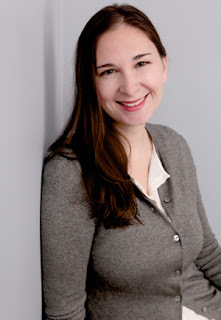 I joined the LKG Agency in 2008, thereby disproving the theory that no English major ever does anything with their degree. Before that I worked at another literary agency, Don Congdon Associates, where I had the behind-the-scenes thrill of seeing Kathryn Stockett’s The Help first come in (and getting one of the first reads). And before that I was getting my Masters in English and Publishing from Rosemont College. I have enjoyed my apprenticeship under Lauren very much, and I am now actively looking to build my own list, which includes (after a surprisingly minimal amount of begging and pleading on my part), securing Lauren’s agreement to open the agency to considering middle grade and young adult fiction.In my spare time, I am an author in my own right (or is that write?). My first book, Lady Vernon and Her Daughter, which I co-wrote with my mother, was released by Crown in 2009. We also contributed to Jane Austen Made Me Do It, published by Ballantine in 2011. My first middle grade novel, Ordinary Magic, was published by Bloomsbury Children’s in 2012.
I joined the LKG Agency in 2008, thereby disproving the theory that no English major ever does anything with their degree. Before that I worked at another literary agency, Don Congdon Associates, where I had the behind-the-scenes thrill of seeing Kathryn Stockett’s The Help first come in (and getting one of the first reads). And before that I was getting my Masters in English and Publishing from Rosemont College. I have enjoyed my apprenticeship under Lauren very much, and I am now actively looking to build my own list, which includes (after a surprisingly minimal amount of begging and pleading on my part), securing Lauren’s agreement to open the agency to considering middle grade and young adult fiction.In my spare time, I am an author in my own right (or is that write?). My first book, Lady Vernon and Her Daughter, which I co-wrote with my mother, was released by Crown in 2009. We also contributed to Jane Austen Made Me Do It, published by Ballantine in 2011. My first middle grade novel, Ordinary Magic, was published by Bloomsbury Children’s in 2012.

Here to relieve some of that endless worrying is a new series of posts called Query Questions. I'll ask the questions which prey on every writer's mind, and hopefully take some of the pain out of querying. These are questions that I've seen tossed around on twitter and writing sites like Agent Query Connect. They are the type of questions that you need answers for the real expert--agents!
If you have your own specific query question, please leave it in the comments and it might show up in future editions of Query Questions as I plan to rotate the questions.
Caitlen Rubino-Bradway is an agent and author with the LKG Agency. She is considering young adult and middle grade and looking to build her list of clients.
Is there a better or worse time of year to query?
For us, the worst times are probably early-December to the second week in Jan, and early Sept/mid June. Things tend to get crazy just before and just after the Winter break and when everyone’s starting their summer vacation or getting back in the fall. Think of it like the school year — if class isn’t in session, it’s not a great time. Except for mid-summer through August, which tends to be a good time to submit because things slow down and there’s a lot of reading time…so basically not like school at all, I guess.
Does one typo or misplaced comma shoot down the entire query?
No, of course not. We’ve all had that moment where we realized our email had a glaring spelling mistake just after we hit send. The problem is when there are multiple typos or bad commas, so it looks like you just hammered the letter out and sent it along without even proofreading it once. If the letter looks sloppy, it’s makes me think that the author isn’t willing to put in the nitty gritty work of publishing. And publishing has a lot of nitty gritty.
Do you look at sample pages without fail or only if the query is strong?
I look at the sample pages 90% of the time. Writing queries is hard, and a lot of times how good, or bad, a query is doesn’t reflect how good/bad the story or writing is. And the best thing that can give me a real sense of your book is the writing sample. If I don’t read the sample pages, it’s because it’s obvious from the query that the project is not something I’m interested in — it’s adult fiction, when we only handle YA and MG, or it’s a subject neither Lauren or I are really interested in.
Do you have an assistant or intern go through your queries first or do you check all of them?
We briefly had an intern, but for the most part it’s just me and Lauren checking all of the queries. Sitting across from each other. Usually sharing a bag of Reese’s mini peanut butter cups.
Do you keep a maybe pile of queries and go back to them for a second look?
Absolutely. Sometimes you’re reading queries at the end of the day and you’re tired, and your brain starts going fuzzy on how this whole ‘word’ thing works. Sometimes a query hits a couple of your rejection flags, but there’s something about it that still hooks us and we need some time to think it over. If something isn’t an obvious yes or no, then we’ll put it aside to read later, and then pass over to whoever hasn’t read it so we can get a second opinion.
If the manuscript has a prologue, do you want it included with the sample pages?
Yup! We ask to see the first three chapters, and I’m happy to take a look at the prologue in addition to that sample material. However, the story has to really convince me it needs a prologue — in my experience, a lot of prologues can fit easily and much more smoothly into the main body of the story later on, or they get very info-dumpy. (I prefer my info-dumps to be select and strategic, as if I’m a five-year-old and you’re trying to sneak veggies into my mac and cheese.)
How important are comp titles? Is it something you want to see in a query?
For fiction, it’s not really important, though an ‘X meets Y’ pitch, or a ‘for fans of X and Z,’ is always a good cheat sheet for me. For nonfiction, comp titles are pretty important, though it’s not something you have to mention in a query — as long as they’re in the proposal, which should have a Competition/Competitive Titles section, and detail 4-5 comparable books and why your book will fill a need they don’t.
Some agencies mention querying only one agent at a time and some say query only one agent period. How often do you pass a query along to a fellow agent who might be more interested?
The LKG Agency is a smaller agency — me and Lauren — and we’re both looking for the same kind of books. Which means we pass queries back and forth all the time, debating whether or not it sounds promising, if we like the sample material, and who should take lead if we want to move forward. Often while sitting across from each other, and then debating whether or not to make s’mores. (The answer is usually yes.)
Do you prefer a little personalized chit-chat in a query letter, or would you rather hear about the manuscript?
I don’t mind if an author wants to chit-chat, or if they just want to get down to business. But I always appreciate it when they casuallydrop a few hints to show they’ve done their research on me, Lauren, and the agency. I love to see they’ve put some time and thought into whether or not we’d be a good match.
Most agents have said they don’t care whether the word count/genre sentence comes first or last. But is it a red flag if one component is not included?
Yes, but not so much that I’m going to reject a query because it’s not included. Honestly, if the word count’s not included, I start worrying that the manuscript is going to be 300,000 words. (And when something is 300,000 words, I start to worry about how receptive the author is going to be towards cuts, because at 300k there’s going to have to be cuts.) And if I can’t tell the genre from the plot blurb in the query, well, then we’ve got bigger problems than categorization.
That being said, you really should include all of the relevant information about your manuscript. If it doesn’t have everything I need and I have to email back to ask for something, there’s a good chance it’s getting moved to the bottom of the pile.
Writers hear a lot about limiting the number of named characters in a query. Do you feel keeping named characters to a certain number makes for a clearer query?
Yes. But I don’t have a set number I recommend for a query. The important thing is to keep the info in your query clean and concise; if I want to learn more, that’s what the synopsis and sample material are for. But when a query starts go into every Tom, Dick, and Zuul that the main character comes across, my eyes start to glaze over.
Should writers sweat the title of their book (and character names) or is that something that is often changed by publishers?
In my experience, the title is changed about 60% of the time, for a variety of reasons. Sometimes they might think it doesn’t reflect the story well. But most of the time it’s because they want a title that’s going to better appeal to your audience, they want to hit certain keywords that tend to make people pick up the book, or they want to avoid comparison with another book that is already out. For instance, my middle grade fantasy was changed from The Extraordinarily Ordinary Tale of Abigail Hale (I’m not great with titles) to Ordinary Magic for all of those reasons — but particularly because at the time Bloomsbury had just published The Extra-Ordinary Princess and they wanted to work the word ‘Magic’ into the title. And while the publisher has final say in the title, they also consult extensively with the author to find a title that everyone is happy with.
As for character names, I’ve never had an editor ask a writer to change them. Though I imagine if you named your character Harry Potter, they’d ask you to change it for obvious reasons.
How many queries do you receive in a week? How many requests might you make out of those?
I’d say we get about 30-50 queries a week, and of those we might pursue five.
Many agents say they don't care if writers are active online. Could a twitter account or blog presence by a writer tip the scales in getting a request or offer? And do you require writers you sign to start one?
Again, it’s different for fiction and nonfiction. In either case, it is kind of expected that an author has an online presence of some kind, but for fiction it isn’t going to make the difference between an offer or a rejection. At the end of the day, it’s always about the story. For nonfiction, however, the author’s platform — the publicity they have at their disposal — is very important. I’ve seen nonfiction proposals bought or sold depending on the platform.
Some writers have asked about including links to their blogs or manuscript-related artwork. I’m sure it’s not appropriate to add those links in a query, but are links in an email signature offensive?
Those links are perfectly appropriate to include in the signature of an email.
If a writer makes changes to their manuscript due to feedback should they resend the query or only if material was requested?
If you’ve made significant changes, then it’s perfectly fine to reach out to the agent and ask if they’d like to see it, whether it’s just been a query or the material’s been requested. But that’s significant changes — if you’ve tweaked something in three chapters then it’s probably not worth reaching out.
What bio should an author with no publishing credits include?
For fiction, they should include any relevant experience, such as writing competitions they’ve won or been finalists in. But, again, it’s all about the story. Don’t panic if you don’t have any publishing credits. For nonfiction, they should include all of their relevant credentials, any degrees they have, letters after their name, or particular experience they have that shows why they’re the best authority on this topic.
What does ‘just not right mean for me’ mean to you?
It means I simply didn’t fall in love with your story. There can be nothing wrong with your story — it can be well-written, with dynamic characters and fast-paced action — but I just didn’t love it. And as an agent, I’m going to put in a lot of time working with you on the story, getting it ready to send out, negotiating the contract, so I need to be passionate about a story when I take it on.
What themes are you sick of seeing?
Dreams. Anything with dreams — meaningful dreams, symbolic dreams, prophetic dreams, magical telepathic dreams in which the main character communicates, and then falls in love with, their love interest. I see that all the time.
Also love triangles. No more love triangles. Please.
Do you consider yourself a hands-on, editorial type of agent?
Very much so. Both because I love working on stories with authors, and because I’m increasingly seeing editors who want manuscripts that are as close to publishing-quality as possible. Plus working on the stories is the fun part!
What three things are at the top of your submission wish list?
Stories with really vibrant and unusual settings, diverse main characters, and YA high fantasy.
What are some of your favorite movies or books to give us an idea of your tastes? I’m a huge Star Wars fan (requisite prequel grumbling), and I tend to find ways to recommend John Wick and Mad Max: Fury Road to anyone I meet, during any conversation, because action and car chases and minimalist storytelling that doesn’t treat the audience like they’re stupid. As for books, basically Terry Pratchett’s entire oeuvre. But I also read Coraline every single Halloween, and I am having a lot of trouble waiting patiently for the next book in Ellie Marney’s Every series. (Seriously, why do they make us wait months between when it’s released in Australia and the US?)
---------------------------------------------------
 I joined the LKG Agency in 2008, thereby disproving the theory that no English major ever does anything with their degree. Before that I worked at another literary agency, Don Congdon Associates, where I had the behind-the-scenes thrill of seeing Kathryn Stockett’s The Help first come in (and getting one of the first reads). And before that I was getting my Masters in English and Publishing from Rosemont College. I have enjoyed my apprenticeship under Lauren very much, and I am now actively looking to build my own list, which includes (after a surprisingly minimal amount of begging and pleading on my part), securing Lauren’s agreement to open the agency to considering middle grade and young adult fiction.In my spare time, I am an author in my own right (or is that write?). My first book, Lady Vernon and Her Daughter, which I co-wrote with my mother, was released by Crown in 2009. We also contributed to Jane Austen Made Me Do It, published by Ballantine in 2011. My first middle grade novel, Ordinary Magic, was published by Bloomsbury Children’s in 2012.
I joined the LKG Agency in 2008, thereby disproving the theory that no English major ever does anything with their degree. Before that I worked at another literary agency, Don Congdon Associates, where I had the behind-the-scenes thrill of seeing Kathryn Stockett’s The Help first come in (and getting one of the first reads). And before that I was getting my Masters in English and Publishing from Rosemont College. I have enjoyed my apprenticeship under Lauren very much, and I am now actively looking to build my own list, which includes (after a surprisingly minimal amount of begging and pleading on my part), securing Lauren’s agreement to open the agency to considering middle grade and young adult fiction.In my spare time, I am an author in my own right (or is that write?). My first book, Lady Vernon and Her Daughter, which I co-wrote with my mother, was released by Crown in 2009. We also contributed to Jane Austen Made Me Do It, published by Ballantine in 2011. My first middle grade novel, Ordinary Magic, was published by Bloomsbury Children’s in 2012.
Published on March 07, 2016 04:30
March 5, 2016
Sequel Complete!
I always think it's fascinating to read about the process of other writers and make comparisons. Every writer is slightly different. Pansters and Plotters. Morning writers versus late night scribblers. People who prefer writing and others who prefer editing. So I thought I'd share a little.
I finished writing my first sequel!

That's cat-me up there, cranking out 27K in two months to finish this sucker! (Yes, it still took me since June, but I took two months off for Pitchwars and another month off when Boy left for college and the rest of the time I was just lazy.) So the follow up to Grudging is done. And the sequel ups the anti on the plot stakes. It puts the characters in worse positions than before. Basically, it says you're screwed to the characters from all directions! And it let me explore the world building from the side of the witches this time around--so Yay! new characters and new situations. Who knew I could manage such an awesome challenge?
Of course I'm anxious to hear what my critique partners say about it. I'm not sure if they will find the pace fast enough or the situation as dark as I believe. I might have missed big plot holes.
While they read, I'm still giving it another once over and correcting small consistency issues. I think the hardest part of writing a sequel is to remember all the bits and pieces of history and behavior that you gave the characters in the first book. It's not easy to get the voice right again in the second book and have the characters carry forward in the same way. Oh yeah, I said that Teresa's parents were dead in the first book, gotta strike out this sentence where she worries about them. Oh and Claire used to talk to inanimate objects, better remember to have her keep doing that.
Because I write so slowly, my first draft tends to be pretty much polished and finished. They don't change much as a whole, though I tweak parts here and there. Which means I don't have much editing work to do until those notes come back.
And Bonus!, the word count came in under 100K just as my super smart editor asked. Yeah, I'm pretty curious to hear what he thinks of it, too. And he likes the title I dreamed up. I get to keep that! (You should follow him on twitter.)
And you want to know the weirdest thing?
The people behind the scenes at HarperCollins have already loaded Faithful up on Amazon and Goodreads and who knows where else. Before I even finished writing the sucker you can preorder it! How awesome is that?
It will be several months until it actually goes to my editor and many more before the cover art comes out or I find out if my editor likes it. My agent will read through it first also.
Meanwhile, I'll change gears and go to work on an older YA fantasy that needs a fresh opening. Fingers crossed it can go out on submission this year. Then over the summer, it will back to work on the final book for the Birth of Saints series.
Not only doesn't it have a title yet, I haven't a clue where it will go! That's what makes it exciting!
So what are you working on as we roll toward spring and will you still be working on it this summer? Have you ever written a sequel and what part did you find most difficult?
I finished writing my first sequel!

That's cat-me up there, cranking out 27K in two months to finish this sucker! (Yes, it still took me since June, but I took two months off for Pitchwars and another month off when Boy left for college and the rest of the time I was just lazy.) So the follow up to Grudging is done. And the sequel ups the anti on the plot stakes. It puts the characters in worse positions than before. Basically, it says you're screwed to the characters from all directions! And it let me explore the world building from the side of the witches this time around--so Yay! new characters and new situations. Who knew I could manage such an awesome challenge?
Of course I'm anxious to hear what my critique partners say about it. I'm not sure if they will find the pace fast enough or the situation as dark as I believe. I might have missed big plot holes.
While they read, I'm still giving it another once over and correcting small consistency issues. I think the hardest part of writing a sequel is to remember all the bits and pieces of history and behavior that you gave the characters in the first book. It's not easy to get the voice right again in the second book and have the characters carry forward in the same way. Oh yeah, I said that Teresa's parents were dead in the first book, gotta strike out this sentence where she worries about them. Oh and Claire used to talk to inanimate objects, better remember to have her keep doing that.
Because I write so slowly, my first draft tends to be pretty much polished and finished. They don't change much as a whole, though I tweak parts here and there. Which means I don't have much editing work to do until those notes come back.
And Bonus!, the word count came in under 100K just as my super smart editor asked. Yeah, I'm pretty curious to hear what he thinks of it, too. And he likes the title I dreamed up. I get to keep that! (You should follow him on twitter.)
And you want to know the weirdest thing?
The people behind the scenes at HarperCollins have already loaded Faithful up on Amazon and Goodreads and who knows where else. Before I even finished writing the sucker you can preorder it! How awesome is that?
It will be several months until it actually goes to my editor and many more before the cover art comes out or I find out if my editor likes it. My agent will read through it first also.
Meanwhile, I'll change gears and go to work on an older YA fantasy that needs a fresh opening. Fingers crossed it can go out on submission this year. Then over the summer, it will back to work on the final book for the Birth of Saints series.
Not only doesn't it have a title yet, I haven't a clue where it will go! That's what makes it exciting!
So what are you working on as we roll toward spring and will you still be working on it this summer? Have you ever written a sequel and what part did you find most difficult?
Published on March 05, 2016 04:30

